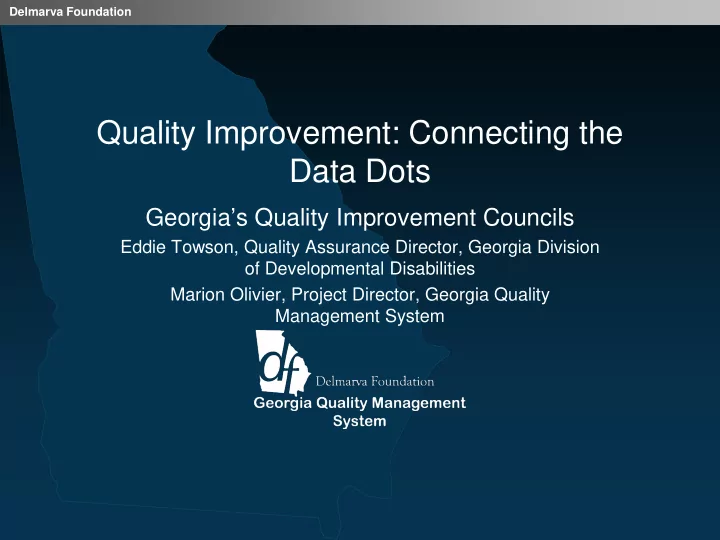

Delmarva Foundation Quality Improvement: Connecting the Data Dots Georgia’s Quality Improvement Councils Eddie Towson, Quality Assurance Director, Georgia Division of Developmental Disabilities Marion Olivier, Project Director, Georgia Quality Management System
Georgia Quality Management System Review Processes Person Centered Review (PCR) Quality Enhancement Provider Review (QEPR) Training Sessions Incident Reporting Tracking and Trending system Reporting System (Review Results) Quarterly and Annual Reports Georgia Developmental Disabilities Provider Website Quality Improvement Council (QI Council) Based upon CMS Quality Framework
Quality Improvement Councils 6 Regional and 1 Statewide Council Quality Improvement Council Members Individuals Receiving Services Family Members Division of Developmental Disabilities Regional Offices Providers Support Coordinators Delmarva (advisor) HSRI (advisor)
Quality Improvement Councils Provide oversight to the statewide quality assurance program Review and evaluate the service delivery system using data Identify areas needing improvement Develop project plans to address areas needing improvement Guide changes to state policy and procedures
Quality Improvement Council Project Plans Data is gathered through the Georgia Quality Management System (Delmarva and National Core Indicators). Aggregate data is presented at annual statewide meeting. The first year of implementation, quarterly data was presented to the Councils. During the second year of implementation, specific data was requested by the individual Councils.
Data
Individual Interview Results from PCR and QEPR by Expectation, July 2008 - June 2009 (N=1283) 1. Involvement in development of annual plan 81.9% 81. 9% 2. Involvement in ongoing evaluation of Support & Service 76. 76.7% 7% 3. Meeting goals, needs, and interests of person 85.4% 85. 4% 4. Choice of S & S and life's decisions 84. 84.1% 1% 5. Health 90.4% 90. 4% 6. Safety 85.9% 85. 9% 7. Rights 68. 68.8% 8% 8. Privacy, Dignity, Respect 94. 94.7% 7% 9. Community involvement and access 74.1% 74. 1% 0% 20% 40% 60% 80% 100% Percent Present
QEPR Provider Record Review by Expectation, July 2008 - June 2009 12. Meets NOW and COMP documentation requirements 68.8% 68. 8% 2. Human and civil rights are maintained 62.8% 62. 8% 10.Means to identify health status/knowledge of safety 40.7% 40. 7% needs 14. The individual directs supports and services 29.1% 29. 1% 9. The individual is afforded choices of services and 27.9% 27. 9% supports 15. The individual chooses services and supports in the 26. 26.7% 7% community 13. The individual is making progress/achieving desired 24. 24.4% 4% goals 1. Documents show person-centered focus 19.8% 19. 8% 0% 20% 40% 60% 80% 100% Percent Present *Order is sorted from higher percents to lower percents.
Support Coordinator Record Review by Expectations, July 2008 - June 2009 (N=480) 1. Person-centered focus shown in the documentation 55.2% 55. 2% 2. Human and civil rights are maintained 87. 87.9% 9% 3. Available services and supports of the individual 67.3% 67. 3% shown 4. CIS contains documents regarding the individual’s 81.7% 81. 7% services 5. Continuously evaluates supports and services 75. 75.6% 6% 6. Effective in assessing and making recommendations 90.0% 90. 0% 7. Confidentiality of the individual’s information is 96.5% 96. 5% protected 8. Individuals are afforded choices of services and 70. 70.8% 8% supports 0% 25% 50% 75% 100% Percent Present
NCI Consumer Survey Selected Results by Focus Areas, July 2008 - June 2009 1. Achieving Results/Person Centered Approach 78.9% 78. 9% 2. Choice 36. 36.4% 4% 3. Health 94. 94.8% 8% 4. Safety 88.8% 88. 8% 5. Rights 80. 80.2% 2% 6. Community Inclusion/Social Roles 68. 68.1% 1% 0% 20% 40% 60% 80% 100% Percent of Positive Responses
NCI CI Co Consumer Su Survey Achieving / Person Ce Centered Appr Approach Percent P Posit itiv ive by Regio ion July 2008 y 2008 - June 2009 2009 100% 87.2% 83.5% 79.0% 78.9% 74.3% 80% 67.6% 60% 40% 20% 0% 1 2 3 4 5 State te Region
NCI Consume mer S Survey Choices Percen ent P Positive b e by Region July ly 2 2008 - June 2009 2009 100% 80% 60% 45.3% 44.1% 43.6% 36.4% 35.7% 40% 22.7% 20% 0% 1 2 3 4 5 State Region
Project Plans Two Regions developed initiatives to increase providers participation in person-centered thinking trainings (based on the work of Michael Smull) Two Regions utilized story-telling to emphasize success in using a person-centered approach to providing supports. One Region developed a survey to gather data on communication barriers at the Regional and State Level. State Council developed an uniform definition of “choice” and identified key practices.
Person Centered Recognition Story
Person Centered Recognition Story
Results of Initiatives At least one person-centered goal addressing “Important To” as a part of every ISP. Increased person-centered trainings to providers. Presentations of self-advocate success stories at regional provider meetings. Production of video highlighting the effects of person- centered approach on the lives of individuals. There are plans to expand communication survey across the state in order to drive Division-level communication planning. Definition of choice submitted to State for approval, and key practices will be incorporated into future training efforts.
NCI and Renewal of COMP Waiver NCI data was identified to be used as evidentiary for the following CMS’ Assurances/Sub-Assurances: Service plans address all participants’ assessed needs (including health and safety risk factors) and personal goals, either by the provision of waiver services or through other means. Participants are afforded choice: Between waiver services and institutional care; and between/among waiver services and providers. The state, on an on-going basis, identifies, addresses and seeks to prevent instances of abuse, neglect and exploitation: Proportion of individuals who receive required medical screenings.
What’s in the Future Annual Data Report will be presented at annual Quality Improvement Council meeting. Councils to present on their own projects at annual meeting. An additional Council to be added. Continuation of data-driven quality improvement efforts. Quarterly Performance Indicator Reports.
Questions? Eddie Towson, Quality Assurance Director – Georgia Division of Developmental Disabilities eltowson@dhr.state.ga.us Marion Olivier, Project Director – Georgia Quality Management System, Delmarva Foundation, Inc. olivierm@dfmc.org www.dfmc-georgia.org
Recommend
More recommend